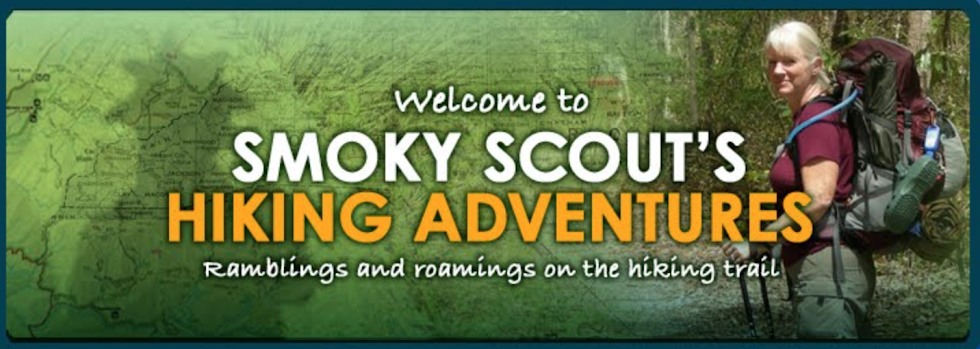Smokies 900 Round 2 Hikes: Metcalf Bottoms Trail/Little
Brier Gap Trail – 10/28/17 – 4.4 Miles
Soaking rain throughout the night, slowed down a little by
morning but not expected to stop. We
didn’t want to waste a day, so Carol and I looked for a hike that offers more than just
checking a box while getting drenched. Today’s the day for a little Smokies
history hike to Little Greenbrier School and the Walker Sisters Cabin.
We broke down camp, throwing everything in the car soaking
wet (to dry out in the garage back home), and drove to the Metcalf Bottoms
picnic area. We watched the rainfall increase as we sat in the car eating our
protein bars, then suited up for the damp cold. There were a few other brave
souls out there.
The school can be accessed by car from April until December,
but the short walk on the Metcalf Bottoms Trail is far better, evoking the feeling of a student going to school. Walking it in the rain is even more authentic. (But I'll bet the schoolkids didn't first go down a little side trail and have to turn around...)
Little Greenbrier School
[Be careful not to
confuse the community of Little Greenbrier on the western side of Gatlinburg with
the community of Greenbrier on the eastern side.]
Back in the day, the mountain community of Little Greenbrier
requested a teacher for its children, and were told that when they provided a
schoolhouse the county government would provide a teacher. The Little
Greenbrier School served the community from 1882 to 1936 as a schoolhouse, a
community center, and a worship space for a Primitive Baptist congregation. The church’s cemetery is beside the
building.
Leaving the schoolhouse, Carol and I walked on Little
Brier Gap Trail to its junction with Little Greenbrier Trail, then turned around
and walked back to the turnoff to the Walker Sisters Cabin.
Wylie King and his wife Mary Jane started their family in a
little log cabin close by in Little Greenbrier Cove in the 1840’s. As the
family grew to 10 children, he built the larger home that stands today. When Wylie
died, daughter Margaret and her husband John Walker moved in with their own
young family, which increased to 11 children, and John dismantled the original
cabin and appended it as the kitchen. (John
Walker also helped to build Little Greenbrier School.)

So far not an unusual story for mountain families in the
1800’s – self-sufficiency and lots of kids – albeit noteworthy that so many
children survived to adulthood. Some
married and moved away, but five sisters remained on the homestead after the
parents were gone. In the 1930’s when the national park was being formed, the
five sisters refused to leave. A compromise
was struck where the sisters allowed their land to be purchased in exchange for
a life lease, an arrangement that was subsequently used for many other farmers
to agree to sell their land for the creation of the park. The Walker sisters remained in their home. The last one, Louisa Susan, died in 1964.
Of all
the outbuildings on John Walker’s hardworking farm, only the corn crib (pictured here) and the springhouse remain
Hiking Trails of the Smokies, also called “the little
brown book,” gives more history of both the school and the Walker
Sisters Cabin as it describes the trails where they are located, along with
several anecdotes about life in that time.
Interested readers can also find detailed descriptions of the trails and buildings
here
and
here.
The simply furnished house is fascinating, picturing that large family living life inside its walls (did winters seem long?). There
are photographs depicting the interior as it was when the sisters lived there,
crammed full of belongings, walls covered in newspaper. The ladder to the upper floor sleeping loft is
daunting – imagine five women of advanced age climbing it each night! Surely they were hardier souls than we are
today.
As the rain abated, Carol and I backtracked to our car,
happy that we’d walked through a little history today. Now we faced a five-hour drive home. Of course we took the scenic route. Home run.
“I’ve come here [Little Greenbrier School] barefoot…frost on
the ground…when our toes would be as red as turkey snouts when we got here.” ~ George Melton, excerpt from Hiking Trails
of the Smokies



















